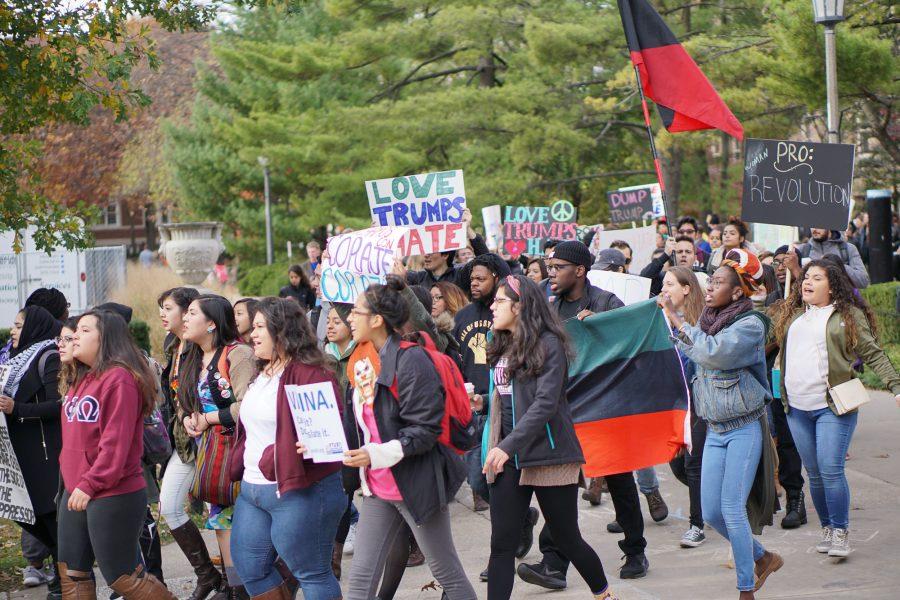Students could learn from peaceful, artistic South Sudan protests
Students gather at Alma Mater to march through the Quad and down Green Street in order to protest President Elect Donald Trump on Friday.
Nov 30, 2016

Y
our alarm goes off and you think to yourself, “I’m tired.” You begrudgingly get out of bed, get read, walk to class and again think, “I’m tired.” You then sit through a night exam all the while still thinking, “I’m tired.”
And, if you’re anything like me, there’s probably another dozen times every day you think this exact thought.
In the newest country in the world, South Sudan, this phrase has recently taken on a very different meaning. A group of activists have named themselves “Ana Taban” — Arabic for, “I’m tired.”
Get The Daily Illini in your inbox!
The group is a collection of artists who have launched a campaign for peace. The goal is to call for an end to the civil war that broke out just two short years after the country became independent in 2011.
There’s been a lot of tension in this country and on campus in the last few months, which has led to a lot of divisiveness among students.
In an effort to express themselves, students have held protest marches and rallies, created trending hashtags and memes to express their thoughts, chalked the Main Quad with slurs and aired their grievances to administrators.
This has not solved any problems and, if anything, has caused more frustration to arise.
In contrast, for the last few months the South Sudanese Ana Taban group has been painting murals in public places, writing pop songs for the radio, performing plays and holding dancing and singing gatherings in public forums.
These responses have brought people together and have been noticed by the authorities, starting a new conversation about change that needs to take place.
Though America is made up of people from different backgrounds, we are all supposed to be one people. America is thought to be a melting pot of cultures, experiences and perspectives. But we have turned against each other, and each day it feels as though violence is intensifying and the sentiment of disunity is growing.
There are over 60 tribes and ethnic groups in South Sudan. Battles between the different groups have led to tens of thousands of deaths over the last few years. The Ana Taban group recognized art as a way that everyone could connect despite language barriers or ethnic beliefs.
Just a few weeks ago, over 1,000 people in South Sudan gathered on a soccer field for an evening concert. They expressed their thoughts in the form of music and dance and tried to send a new message of unity to the people of the country.
When tensions run high and anger surrounds, it is easy to take the approach of responding with frustration. It makes us feel good to find others equally mad and come together to pronounce how upset we are.
But if we can take a step back and gain new perspective on our issues — if we can stop pointing at our differences and find commonalities and come together — then we can send a different message to the rest of our country.
There is no reason to not follow the lead of movements like this one in South Sudan.
On this campus, if we found ways to bring together different groups and promote our plans for the future, it would be incredible.
We don’t need to band together in defeat. We don’t need to see ourselves always as victims.
Our lives in this world will be what we make of them. So we need to change the way we address our societal imperfections.
We may be tired, but that doesn’t mean we can’t start a change in how we act moving forward.
Hayley is a sophomore in ACES.
[email protected]






